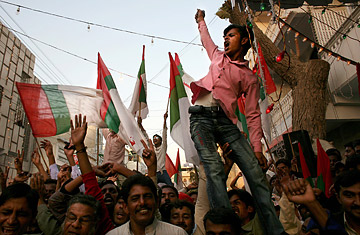
Supporters of Pakistan's Pro-Musharraf Muttahida Quami Movement party celebrate the results in favor of their candidate in Karachi on February 19, 2008.
Pakistan's two main opposition parties were the big winners in Monday's parliamentary elections, and they plan to use their gains to form a coalition government that could threaten President Pervez Musharraf's weakening grip on power. The Pakistani People's Party (PPP) of assassinated former Prime Minister Benazir Bhutto and the Pakistan Muslim League-Nawaz (PML-N) of former Prime Minister Nawaz Sharif have, together, won more than half the seats so far counted, easily defeating the Musharraf-aligned PML-Q party. If the PPP and PML-N win two-thirds of parliamentary seats, they will be in a position to impeach Musharraf, who on Tuesday said he would accept the results of the landmark poll.
According to results reported thus far, the PPP has won 87 seats in the 272-seat parliament and the PML-N 66, a combined total of 153. The ruling PML-Q party, badly tainted by its association with the widely unpopular President, has seen support plummet and has won just 38. Most of Musharraf's cabinet, including his party president, speaker of the house and several other close allies, appear to have lost their reelection bids. Chaudhry Shujaat Hussain, head of the PML-Q, conceded defeat. "We accept the results with an open heart" and "will sit on opposition benches" in the new parliament, he told the Associated Press.
Turnout in the elections was low. Official estimates put it at less than 40% of Pakistan's 81 million eligible voters. But the resounding win for the opposition parties is seen as a repudiation of Musharraf's eight years in power. The other big losers were Pakistan's fundamentalist religious parties, who have lost control in the North West Frontier Province, which they had ruled since 2002. Frustrated with the religious parties' alliance with Musharraf and with their mismanagement of the NWFP economy, voters opted for secular opposition parties instead.
As the results became known, celebratory gunfire was heard in Karachi; in the streets of Rawalpindi, Musharraf's hometown, PPP supporters danced in the streets. Prior to the election, many Pakistanis said they feared the voting would be rigged to ensure most incumbents won. But PML-N party candidates swept to convincing wins in Punjab, Pakistan's largest province. Results from Sindh province, a PPP stronghold, are not complete and analysts expect further gains for the party as more votes are counted.
If the PPP, which is now led by Bhutto's widower, Asif Ali Zardari, and Sharif's party can agree a workable union — no sure thing in the mercurial world of Pakistani politics — they are likely to make life very difficult for Musharraf, who seized power in a bloodless 1999 coup. The former army head and key U.S. ally in the war on terror says he will not resign and will work with the new government.
But that will not be easy. Sharif, who returned to Pakistan on Nov. 24 after eight years in exile following his overthrow by Musharraf, has pledged to reinstate the Supreme Court judges dismissed by Musharraf when he suspended the country's constitution and established emergency rule on Nov. 3. Many of those judges are believed to view Musharraf's controversial election last year to a second presidential term as unconstitutional. Both the PPP and the PML-N also want Musharraf gone. "What we need to clean up the mess is to get back to the beginning," says PPP media coordinator Farahnaz Ispahani. Ultimately both parties share the same goal, she added. "We are like husband and wife. We share love, but we disagree about how to raise the children. We all want to see an independent judiciary."
